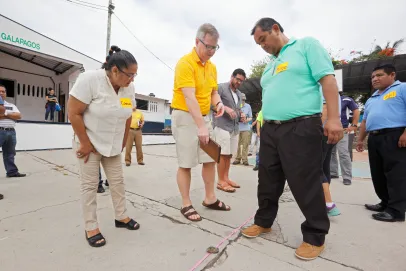Lessons from the Galápagos
May 25, 2016
 By:
Tim Pope - Curriculum Director
By:
Tim Pope - Curriculum Director
I had the privilege last month of spending a week in the Galápagos Islands working with math teachers as part of the Galápagos Conservancy’s Education for Sustainability in Galápagos program through a partnership with Teachers 2 Teachers International. More than 270 Galapagos teachers participated in intensive workshops delivered by education specialists from mainland Ecuador, the US and Puerto Rico. An important goal of this initiative is to ensure that future generations of Galapagueños have the knowledge and skills to play leadership roles in protecting the natural resources of the Galápagos Islands.
I was struck by the many similarities facing these incredibly dedicated teachers and educators here in the States with the implementation of the Common Core.
- Preparing students to protect the unique and invaluable ecosystem of the Galápagos is a localized version of the “college and career ready” phrase used by the Common Core. Until this point, my mindset around college and career ready was thinking about the mathematics content students needed to know to be successful in a variety of careers and vocations. In working with the teachers on the Islands, I came to realize that while the math content is still important, the value of college and career ready is also on providing opportunities for students to directly study how mathematics can help identify and solve problems. It is not simply “you need to know how to find a line of best fit”, but “you need to know how to predict the effect of population increase on the available habitat for the endangered Galápagos tortoise”.
- Instructional shifts require systemic, committed support from all stakeholders. The Conservancy has done a wonderful job garnering the support of the Ministry of Education (the islands do not have district or state administrative structures like we do in the States). There is also a commitment to providing training for teachers and day-to-day coaching (and these teachers have a phenomenal coach in Miriam Chacon). Most importantly, there is a commitment from the teachers and a desire to meet the needs of their students.
- A school community needs to take ownership of their chosen instructional and pedagogical model. The part of the week that brought me the most joy was the last day. After spending the week sharing lessons and strategies (plug here for the source of these lessons, Discovering Algebra, and Kendall Hunt who supported me on this trip), teachers were invited to work together to adapt/create a lesson that integrated the idea of looking at mathematics through culturally-relevant context using student-centered strategies. I was amazed at their ability to so quickly change their mindset and create engaging lessons! This is no longer a top-down PD required by the bureaucracy, but a group of teachers owning a process to make it work for them and their students.
For as much as the intent of my trip was to provide support and instruction for the math teachers of the Galápagos, I can only hope the learning community there learned a fraction of what I gained.
